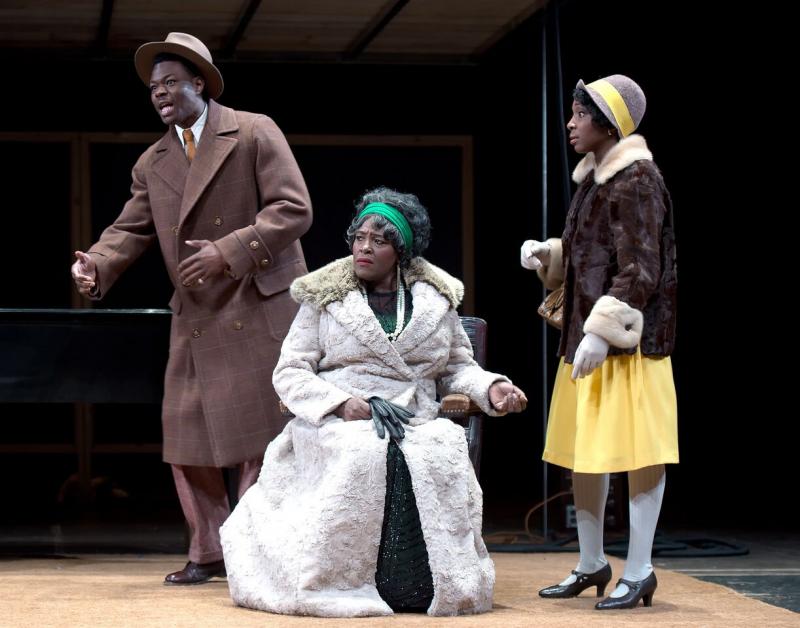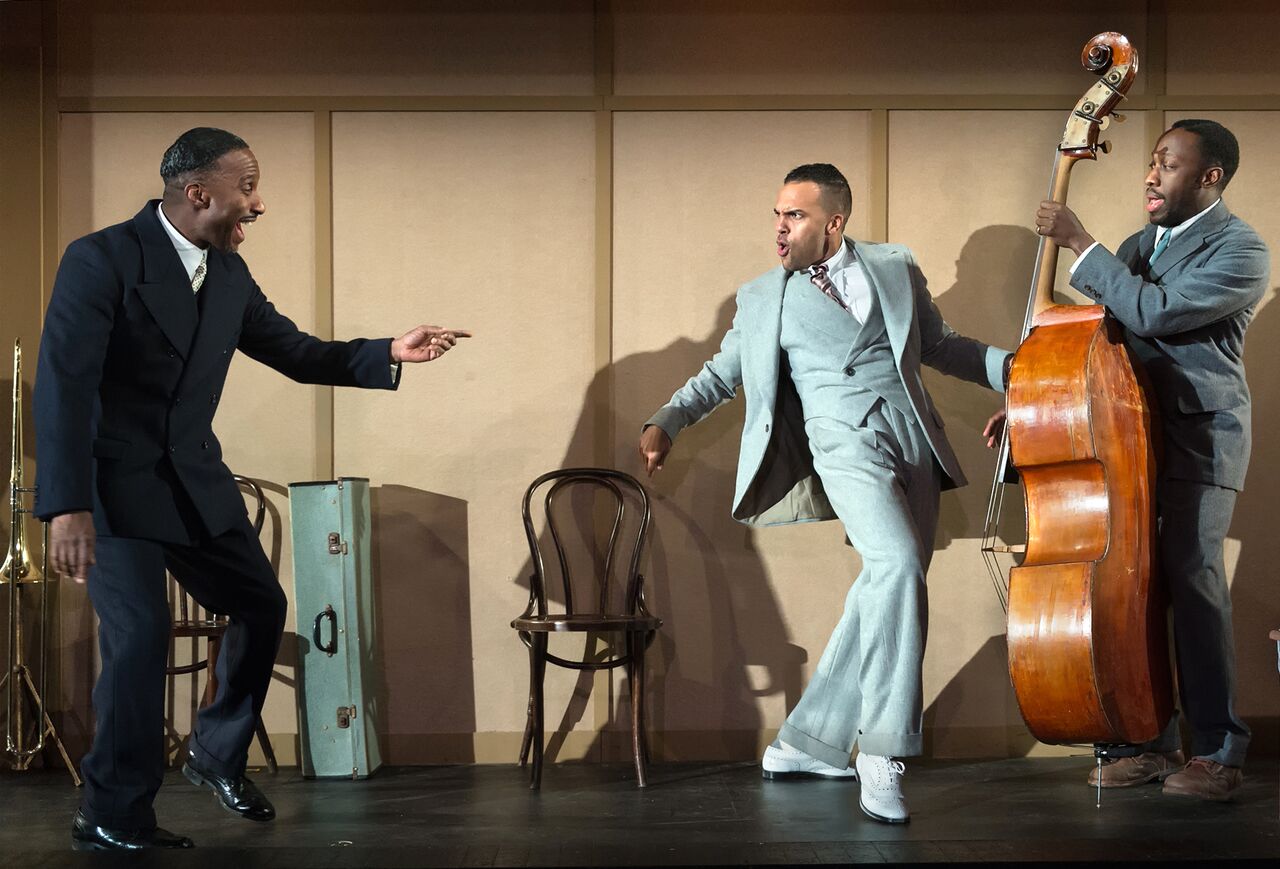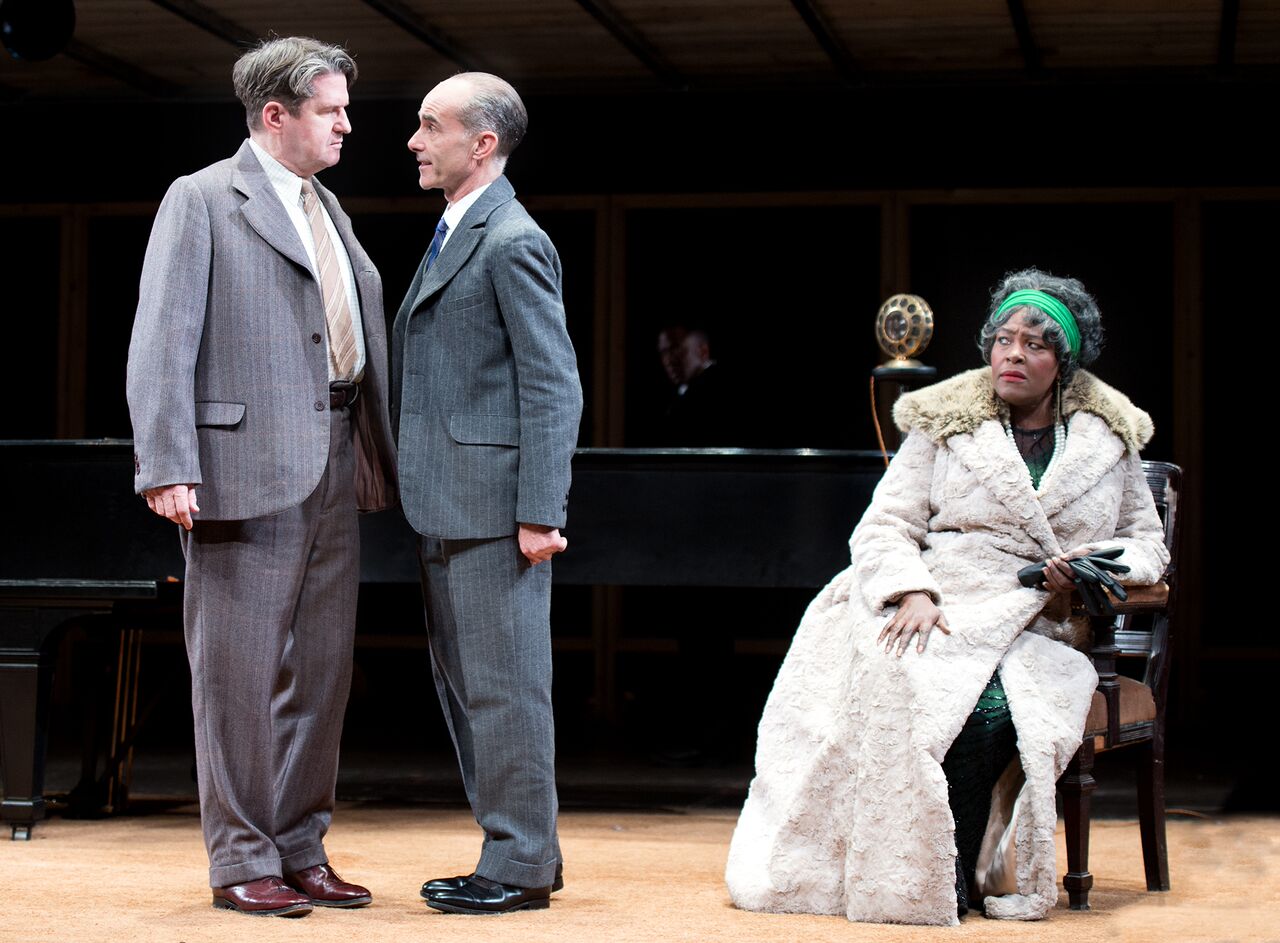Ma Rainey's Black Bottom, National Theatre | reviews, news & interviews
Ma Rainey's Black Bottom, National Theatre
Ma Rainey's Black Bottom, National Theatre
August Wilson's Broadway debut dazzles anew

"One... Two... You know what to do": that coolly delivered rehearsal intro from a trombonist called Cutler (Clint Dyer) could serve as a synoptic appraisal of the simply overwhelming National Theatre revival of Ma Rainey's Black Bottom.
For that, credit the surpassing empathy of a director in Dominic Cooke, who brings much the same easy, fully attuned command of Wilson's singular landscape – that's to say, of an often funny and salty play's ultimately grievous and sorrowful arc – that Cooke some years back invested in his still-unsurpassed production of The Crucible for the RSC; indeed, you'd have to stretch back to Nicholas Hytner's scorching revival of Carousel in this same auditorium in 1992 to find a canonical American title so searchingly reinvigorated at this address.
 The writing every bit as tangy and pungent as one remembers, this Ma Rainey delivers first off on the play's primary achievement, which is to float language so that it acquires the theatrical pungency and force of the blues music that also happens to be its terrain.
The writing every bit as tangy and pungent as one remembers, this Ma Rainey delivers first off on the play's primary achievement, which is to float language so that it acquires the theatrical pungency and force of the blues music that also happens to be its terrain.
Set in 1927 in a rundown Chicago recording studio that finds the eponymous "mother of the blues", Gertrude "Ma" Rainey, arriving an hour late for a recording session while her four band members jam separately, teasing one another and telling stories to pass the time, Ma Rainey couples intricate teamwork with individual verbal arias and riffs that give everyone a chance to chew on speech that makes one realise how parched so much writing for the theatre is. (The bookish piano player Toledo's account of the "stew" that history has made of the African experience is one rhetorical glory of many.)
And when the devastating ending comes – a finish as inevitable as it may be surprising for first-timers to this play – Cooke in an instant silences those (few, if vocal) critics who over the years have dismissed the conclusion as melodrama. In fact, and as carefully prepared for on this occasion by the charismatically feral O-T Fagbenle in the defining role of the volatile trumpeter Levee, Ma Rainey exits on a searing note that transcends both the eras when the play is set and when it was written to remind us that misdirected rage is not just a component part and legacy of racism; it's a baleful fact of human life. (Fagbenle pictured above, flanked by Clint Dyer and Giles Terera.)
'Ma Rainey' re-emerges as something near-miraculous
Fagbenle's comparatively few stage credits include the 2006 West End revival of Porgy and Bess, and one sees elements of his saturnine Sportin' Life in the slithery, sinuous physicality he brings to Levee – a stage presence that is the intriguing antithesis to the mighty Charles Dutton, who originated the part and then returned to it in the misbegotten Broadway revival in 2003 that warped Wilson's play into a star vehicle for a miscast Whoopi Goldberg. As loose with his body as he is quick to react in speech, Fagbenle brings a simmering, essentially unknowable danger – it's death, he notes ominously, that has "style" and not life – to a self-described artist whose handle on the music of a changing era turns out not to be to "Madame" Rainey's taste.
Couple the gathering disregard for his gifts with the unshakeable memory of a terrible incident from his past, the recollection of which brings act one to a wounding close, and you have a human fireball every bit as decisive and determined as "Ma" Rainey, the crucial difference being that in a play concerned with hierarchy, Levee has precisely no power. His climactic action comes from the very need for respect that underlies any number of the not dissimilar incidents that one encounters regularly in the news today.
 The entire cast function as a shifting organic whole and as an amalgam of richly individuated performances, even if several of the band members, described as mid-fifties in the script, are self-evidently too young to have been playing together 22 years. That said, I can't imagine a better Toledo than a bespectacled, immediately endearing Lucian Msamati, all gracefully imparted reason as he warns against seeking approval from a white populace that really doesn't care. Giles Terera brings some fierce vocals to the wonderfully named bass player Slow Drag (his delivery of the single word "tear" at the first-act close haunts the act that follows), while Dyer's buoyantly achieved Cutler wears charm like a shield, as if the best way to handle life's iniquities were simply to smile and wave them away.
The entire cast function as a shifting organic whole and as an amalgam of richly individuated performances, even if several of the band members, described as mid-fifties in the script, are self-evidently too young to have been playing together 22 years. That said, I can't imagine a better Toledo than a bespectacled, immediately endearing Lucian Msamati, all gracefully imparted reason as he warns against seeking approval from a white populace that really doesn't care. Giles Terera brings some fierce vocals to the wonderfully named bass player Slow Drag (his delivery of the single word "tear" at the first-act close haunts the act that follows), while Dyer's buoyantly achieved Cutler wears charm like a shield, as if the best way to handle life's iniquities were simply to smile and wave them away.
That's not the option taken by Ma Rainey herself, to whom the extraordinary Sharon D Clarke brings a granitic resolve that insists on all manner of small demands (a warmer recording studio, for starters) because she knows on some level that the larger battle has been lost. That much is clear from the "no admittance" sign that keeps the black musicians apart from their white bosses (Stuart McQuarrie and Finbar Lynch, both excellent, pictured with Clarke above), a segregation amplified in Ultz's canny design by the subterranean, cell-like space to which the band members are relegated: a cage in fact if not in name to which the musicians have been consigned by a world in which, or so we're told, God has gone to sleep.
Has He, though, or does He live on in the music that informs every beat and pulse of Wilson's play? Whatever your feelings on religion, Ma Rainey re-emerges as something near-miraculous.
- Ma Rainey's Black Bottom in repertory at the National Theatre, Lyttelton to 18 May
rating
Explore topics
Share this article
The future of Arts Journalism
You can stop theartsdesk.com closing!
We urgently need financing to survive. Our fundraising drive has thus far raised £49,000 but we need to reach £100,000 or we will be forced to close. Please contribute here: https://gofund.me/c3f6033d
And if you can forward this information to anyone who might assist, we’d be grateful.

Subscribe to theartsdesk.com
Thank you for continuing to read our work on theartsdesk.com. For unlimited access to every article in its entirety, including our archive of more than 15,000 pieces, we're asking for £5 per month or £40 per year. We feel it's a very good deal, and hope you do too.
To take a subscription now simply click here.
And if you're looking for that extra gift for a friend or family member, why not treat them to a theartsdesk.com gift subscription?
more Theatre
 The Harder They Come, Stratford East review - still packs a punch, half a century on
Natey Jones and Madeline Charlemagne lead a perfectly realised adaptation of the seminal movie
The Harder They Come, Stratford East review - still packs a punch, half a century on
Natey Jones and Madeline Charlemagne lead a perfectly realised adaptation of the seminal movie
 The Weir, Harold Pinter Theatre review - evasive fantasy, bleak truth and possible community
Three outstanding performances in Conor McPherson’s atmospheric five-hander
The Weir, Harold Pinter Theatre review - evasive fantasy, bleak truth and possible community
Three outstanding performances in Conor McPherson’s atmospheric five-hander
 Dracula, Lyric Hammersmith review - hit-and-miss recasting of the familiar story as feminist diatribe
Morgan Lloyd Malcolm's version puts Mina Harkness centre-stage
Dracula, Lyric Hammersmith review - hit-and-miss recasting of the familiar story as feminist diatribe
Morgan Lloyd Malcolm's version puts Mina Harkness centre-stage
 Reunion, Kiln Theatre review - a stormy night in every sense
Beautifully acted, but desperately grim drama
Reunion, Kiln Theatre review - a stormy night in every sense
Beautifully acted, but desperately grim drama
 The Code, Southwark Playhouse Elephant review - superbly cast, resonant play about the price of fame in Hollywood
Tracie Bennett is outstanding as a ribald, riotous Tallulah Bankhead
The Code, Southwark Playhouse Elephant review - superbly cast, resonant play about the price of fame in Hollywood
Tracie Bennett is outstanding as a ribald, riotous Tallulah Bankhead
 The Lady from the Sea, Bridge Theatre review - flashes of brilliance
Simon Stone refashions Ibsen in his own high-octane image
The Lady from the Sea, Bridge Theatre review - flashes of brilliance
Simon Stone refashions Ibsen in his own high-octane image
 Romans: A Novel, Almeida Theatre review - a uniquely extraordinary work
Alice Birch’s wildly epic family drama is both mind-blowing and exasperating
Romans: A Novel, Almeida Theatre review - a uniquely extraordinary work
Alice Birch’s wildly epic family drama is both mind-blowing and exasperating
 The Producers, Garrick Theatre review - Ve haf vays of making you laugh
You probably know what's coming, but it's such great fun!
The Producers, Garrick Theatre review - Ve haf vays of making you laugh
You probably know what's coming, but it's such great fun!
 Not Your Superwoman, Bush Theatre review - powerful tribute to the plight and perseverance of Black women
Golda Rosheuvel and Letitia Wright excel in a super new play
Not Your Superwoman, Bush Theatre review - powerful tribute to the plight and perseverance of Black women
Golda Rosheuvel and Letitia Wright excel in a super new play
 Cow | Deer, Royal Court review - paradox-rich account of non-human life
Experimental work about nature led by Katie Mitchell is both extraordinary and banal
Cow | Deer, Royal Court review - paradox-rich account of non-human life
Experimental work about nature led by Katie Mitchell is both extraordinary and banal
 Deaf Republic, Royal Court review - beautiful images, shame about the words
Staging of Ukrainian-American Ilya Kaminsky’s anti-war poems is too meta-theatrical
Deaf Republic, Royal Court review - beautiful images, shame about the words
Staging of Ukrainian-American Ilya Kaminsky’s anti-war poems is too meta-theatrical
 Laura Benanti: Nobody Cares, Underbelly Boulevard Soho review - Tony winner makes charming, cheeky London debut
Broadway's acclaimed Cinderella, Louise, and Amalia reaches Soho for a welcome one-night stand
Laura Benanti: Nobody Cares, Underbelly Boulevard Soho review - Tony winner makes charming, cheeky London debut
Broadway's acclaimed Cinderella, Louise, and Amalia reaches Soho for a welcome one-night stand

Add comment